Unit 5 Do you have a soccer ball? 复习课 课件(共24张PPT)
文档属性
| 名称 | Unit 5 Do you have a soccer ball? 复习课 课件(共24张PPT) |  | |
| 格式 | pptx | ||
| 文件大小 | 262.7KB | ||
| 资源类型 | 教案 | ||
| 版本资源 | 人教新目标(Go for it)版 | ||
| 科目 | 英语 | ||
| 更新时间 | 2021-11-17 14:48:08 | ||
图片预览

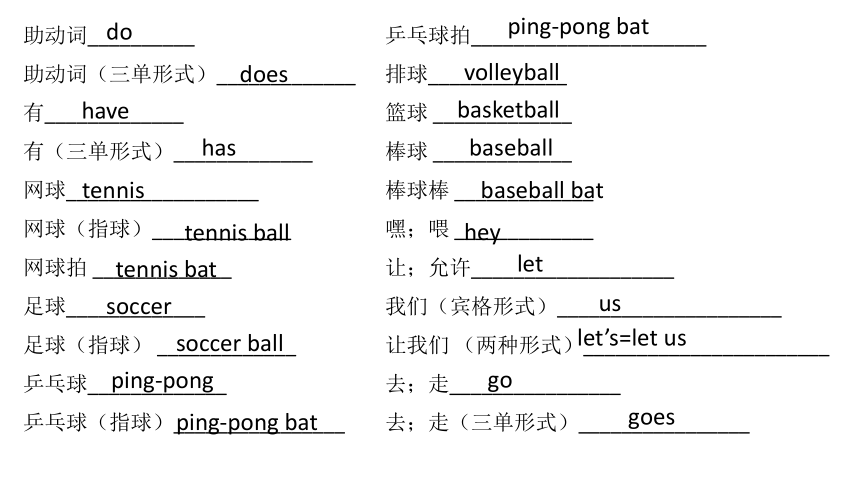
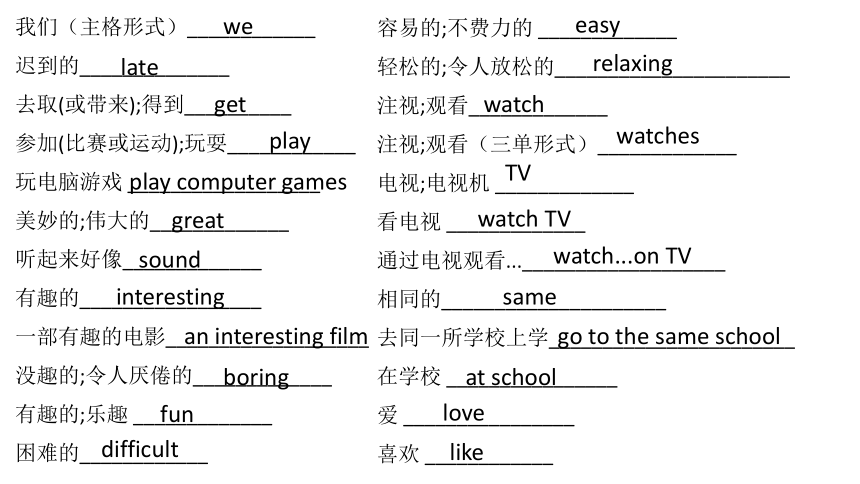
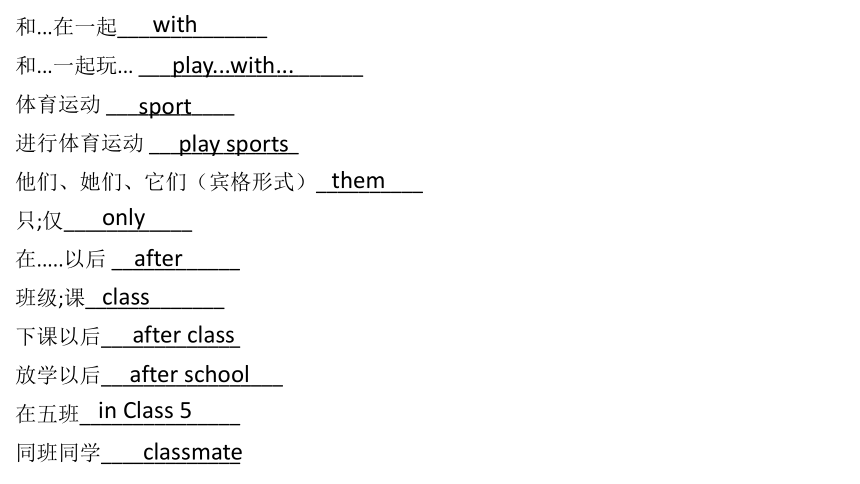

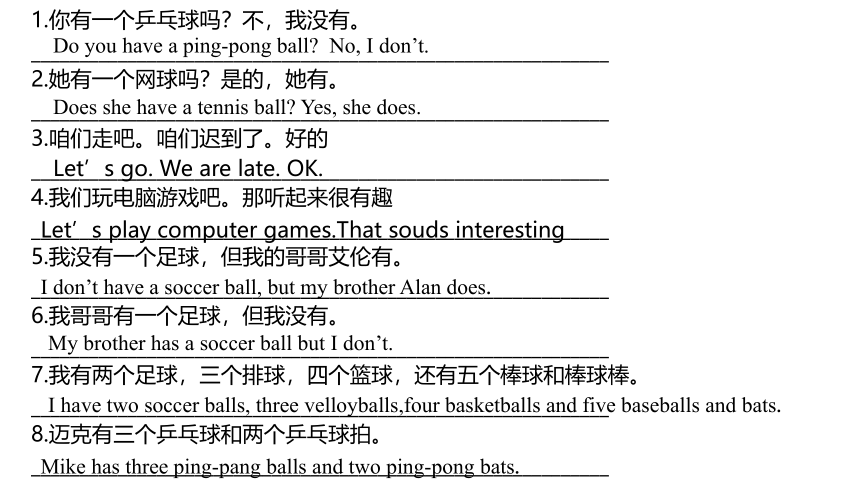
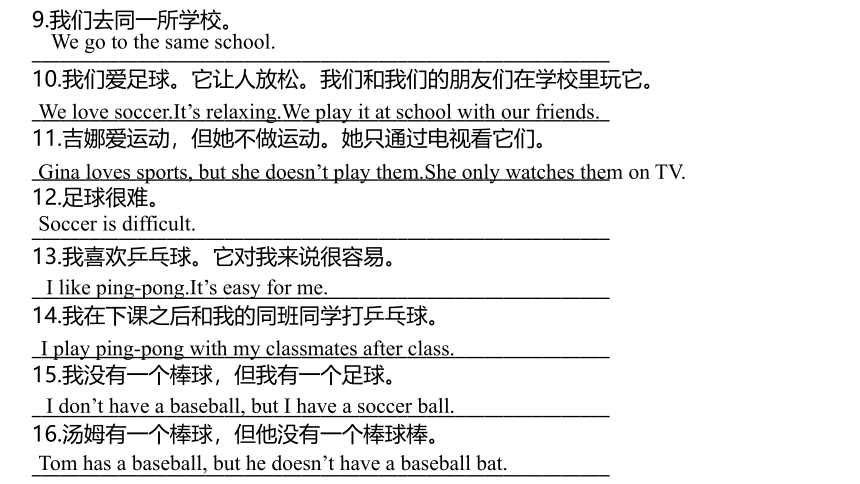

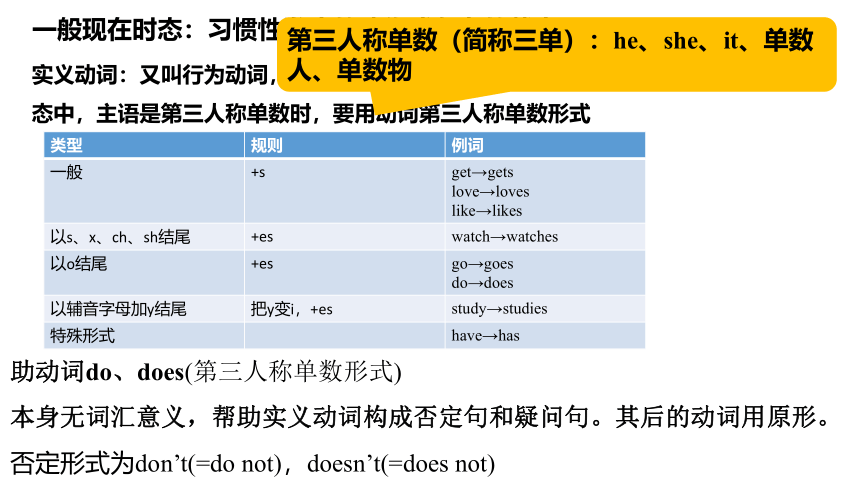
文档简介
(共24张PPT)
词汇
助动词__________
助动词(三单形式)_____________
有_____________
有(三单形式)_____________
网球__________________
网球(指球)_____________
网球拍 _____________
足球_____________
足球(指球) _____________
乒乓球_____________
乒乓球(指球)________________
乒乓球拍______________________
排球_____________
篮球 _____________
棒球 _____________
棒球棒 _____________
嘿;喂 _____________
让;允许___________________
我们(宾格形式)_____________________
让我们 (两种形式)_______________________
去;走________________
去;走(三单形式)________________
do
does
have
has
tennis
tennis ball
tennis bat
soccer
soccer ball
ping-pong
ping-pong bat
ping-pong bat
volleyball
basketball
baseball
baseball bat
hey
let
us
let’s=let us
go
goes
我们(主格形式)____________
迟到的______________
去取(或带来);得到__________
参加(比赛或运动);玩耍____________
玩电脑游戏 __________________
美妙的;伟大的_____________
听起来好像_____________
有趣的_________________
一部有趣的电影___________________
没趣的;令人厌倦的_____________
有趣的;乐趣 _____________
困难的____________
容易的;不费力的 _____________
轻松的;令人放松的______________________
注视;观看_____________
注视;观看(三单形式)_____________
电视;电视机 _____________
看电视 _____________
通过电视观看...___________________
相同的_____________________
去同一所学校上学_______________________
在学校 ________________
爱 ________________
喜欢 ____________
we
late
get
play
play computer games
great
sound
interesting
boring
fun
difficult
easy
relaxing
watch
watches
TV
watch TV
watch...on TV
same
go to the same school
at school
love
like
an interesting film
和...在一起______________
和...一起玩... _____________________
体育运动 ____________
进行体育运动 ______________
他们、她们、它们(宾格形式)__________
只;仅____________
在.....以后 ____________
班级;课_____________
下课以后_____________
放学以后_________________
在五班_______________
同班同学_____________
with
play...with...
sport
play sports
them
only
after
class
after class
in Class 5
after school
classmate
句子
1.你有一个乒乓球吗?不,我没有。
____________________________________________________________
2.她有一个网球吗?是的,她有。____________________________________________________________
3.咱们走吧。咱们迟到了。好的
____________________________________________________________
4.我们玩电脑游戏吧。那听起来很有趣
____________________________________________________________
5.我没有一个足球,但我的哥哥艾伦有。
____________________________________________________________
6.我哥哥有一个足球,但我没有。____________________________________________________________
7.我有两个足球,三个排球,四个篮球,还有五个棒球和棒球棒。____________________________________________________________
8.迈克有三个乒乓球和两个乒乓球拍。____________________________________________________________
Do you have a ping-pong ball No, I don’t.
Does she have a tennis ball Yes, she does.
Let’s go. We are late. OK.
Let’s play computer games.That souds interesting
I don’t have a soccer ball, but my brother Alan does.
My brother has a soccer ball but I don’t.
I have two soccer balls, three velloyballs,four basketballs and five baseballs and bats.
Mike has three ping-pang balls and two ping-pong bats.
9.我们去同一所学校。____________________________________________________________
10.我们爱足球。它让人放松。我们和我们的朋友们在学校里玩它。____________________________________________________________
11.吉娜爱运动,但她不做运动。她只通过电视看它们。
____________________________________________________________
12.足球很难。____________________________________________________________
13.我喜欢乒乓球。它对我来说很容易。____________________________________________________________
14.我在下课之后和我的同班同学打乒乓球。____________________________________________________________
15.我没有一个棒球,但我有一个足球。____________________________________________________________
16.汤姆有一个棒球,但他没有一个棒球棒。____________________________________________________________
We go to the same school.
We love soccer.It’s relaxing.We play it at school with our friends.
Gina loves sports, but she doesn’t play them.She only watches them on TV.
Soccer is difficult.
I like ping-pong.It’s easy for me.
I play ping-pong with my classmates after class.
I don’t have a baseball, but I have a soccer ball.
Tom has a baseball, but he doesn’t have a baseball bat.
语法
一般现在时态:习惯性发生的动作或存在的状态
实义动词:又叫行为动词,表示动作或状态的词,在句子中作谓语。在一般现在时态中,主语是第三人称单数时,要用动词第三人称单数形式
助动词do、does(第三人称单数形式)
本身无词汇意义,帮助实义动词构成否定句和疑问句。其后的动词用原形。
否定形式为don’t(=do not),doesn’t(=does not)
类型 规则 例词
一般 +s get→gets
love→loves
like→likes
以s、x、ch、sh结尾 +es watch→watches
以o结尾 +es go→goes
do→does
以辅音字母加y结尾 把y变i,+es study→studies
特殊形式 have→has
第三人称单数(简称三单):he、she、it、单数人、单数物
我打排球。
__________________________________
他们看电视。
__________________________________
她去学校。
__________________________________________
那个男孩拿来两个篮球。__________________________________________
三单:主语+动词的三单形式+宾语
非三单:主语+动词原形+宾语
I play volleyball.
She goes to school.
1、实义动词构成的肯定句:
They watch TV.
That boy gets two basketballs.
我不打排球。
__________________________________
他们不看电视。
__________________________________
她没有去学校。
__________________________________________
那个男孩没有拿来两个篮球。__________________________________________
三单:主语+doesn’t+动词原形+宾语
非三单:主语+don’t+动词原形+宾语
I don’t play volleyball.
She doesn’t go to school.
2、实义动词构成的否定句:
They don’t watch TV.
That boy doesn’t get two basketballs.
你打排球吗?是的,我打。
__________________________________
他们看电视吗?不,他们不看。
__________________________________
她去学校吗?是的,她去。
__________________________________________
那个男孩拿来两个篮球吗?不,他没有。__________________________________________
三单:
Does+主语+动词原形+宾语?回答:Yes,主语代词 does./No,主语代词 doesn’t.
非三单:
Do+主语+动词原形+宾语?回答:Yes,主语代词 do./No,主语代词 don’t.
Do you play volleyball?Yes,I do.
Does she go to school?Yes,she does.
3、实义动词构成的一般疑问句:
Do they watch TV?No,they don’t.
Does that boy get two basketballs?No,he doesn’t.
我有三个排球。
__________________________________
我的朋友们有一个足球。
__________________________________
她有一个乒乓球拍。__________________________________________
他哥哥有两个篮球。__________________________________________
三单:主语+has+宾语
非三单:主语+have+宾语
I have three volleyballs.
She has a ping-pong bat.
1、陈述某物的归属:have、has(第三人称单数形式) 有,主语是人
My friends have a soccer ball.
His brother has two basketballs.
他有一个足球吗?不,他没有。__________________________________________
艾米有一个排球吗?是的,她有。__________________________________________
你有一个棒球吗?是的,我有。
__________________________________
他们有一个网球拍吗?不,他们没有。
__________________________________
三单:Does+主语+have+宾语?Yes,主语代词 does./No,主语代词 doesn’t.
非三单:Do+主语+have+宾语?Yes,主语代词 do./No,主语代词 don’t.
Do you have a baseball?Yes,I do.
Does he have a soccer ball?No,he doesn’t.
2、确认某物的归属:
Do they have a tennis bat?No,they don’t.
Does Amy have a volleyball?Yes,she does.
Let’s+动词原形
让我们...,表示建议
Let’s=Let us,us可替换为其他的宾格
如:Let me/him/her/them
肯定回答:OK./Great/All right./That sounds good./Good idea./...
否定回答:Sorry, I... 对不起,我……
让我打扫房间吧。好的。__________________________________________
让他们去取排球吧。好主意。__________________________________________
Let me clean the room. OK
Let them get volleyballs. Good idea.
love 爱;喜爱,近义词为 like喜欢,但love感彩比like更强烈。两者后面都可以接名词、代词、动词-ing。
他喜爱他的狗。
__________________________________________
他喜爱喂(feed)它。
__________________________________________
我喜欢乒乓球运动。
__________________________________________
我喜欢打乒乓球。
__________________________________________
He loves his dog.
He loves feeding it.
I like ping-pong.
I like playing ping-pong.
That sounds good.
(1)that为第三人称单数,所以soud后加s
(2)sound v.听起来好像,后接形容词
那听起来很有趣。
__________________________________
那听起来真棒。
____________________________________
That sounds interesting.
That sounds great.
It is easy for me.
表示对某事物的看法:某事物+be+形容词+for+某人
(1)be的单复数由主语决定
(2)for后加人称代词的宾格形式
电脑对我爷爷来说挺难,但对我来说很简单。
_____________________________________________________
体育运动对你有好处!
______________________________________________________
Computer is difficult for my grandfather, but it’s easy for me.
Sports are good for you!
表示某人迟到了:某人+be+late
be动词随主语的单复数而变
你迟到了。
__________________________________________
琳达迟到了。
__________________________________________
她们迟到了
___________________________________________
You are late
Linda is late.
They are late.
(1)play后接表示球类运动的名词,表示进行某项球类运动。
(2) play作动词还可意为 “玩耍”,play...with....表示“和...一起玩……”。
with后加人称代词宾格形式
play v.参加(比赛或运动); 玩耍
我和我妹妹放学后打篮球。
__________________________________________
琳达和她们一起打网球。
__________________________________________
他和我一起玩电脑游戏
___________________________________________
I play basketball with my sister after school.
Linda plays tennis with them.
He plays computer games with me.
I don’t have a soccer ball, but my brother Alan does.
(1)but是并列连词,意为“但是”,用来连接两个并列成分,表示转折关系。
(2)but后的句子是一个省略句,完整表达是“but my brother Alan has a soccer ball”。为避免重复,此处用does代替了“has a soccer ball”
我喜欢苹果,但是他不喜欢。
_____________________________________________________
他没有一个篮球,但是我有。
_____________________________________________________
I like apples, but he doesn’t .
He doesn’t have a basketball, but I do.
We go to the same school .
same通常与the连用,修饰单数名词。构成短语:the same... 意为“相同的……”。
我们喜欢同一种颜色。
————————————————————
莉莉和我在同一个班。
————————————————————
Lily and I are in the same class.
We like the same color.
开头:1、Hello!My name is ....
2、My friend is ...
中间:
介绍体育用品
1、I have ... but I don’t have ....
2、He/She has ...,but he/she doesn’t have ....
结尾:We love sports.They are good for us.What about you
介绍自己和别人拥有的体育用品和对某项体育运动的看法。
介绍对某项运动的好恶
1、I like ping-pong.It is easy for me.I play ping-pong with my classmates after school.I don’t like soccer.It is difficult.
2、He/She likes basketball.It is fun for him/her.He/She doesn’t like tennis.It is boring for him/her.He/She doesn’t play tennis and he/she only watch it on TV.
Hello!My name is Dale.My friend is Anna.I have two basketballs,one baseball and two volleyballs.But I don’t have a soccer ball.Anna has five ping-pong balls,three soccer balls.But she doesn’t have a baseball.I like basketball.It is interesting for me.And I like volleyball,too.It is easy.I always play volleyball with my friends.Anna likes ping-pong.It’s relaxing for her.She doesn’t like playing baseball.It is difficult for her and she only watches it on TV. We like sports.what abou you
假如你是Dale,Anna是你的好朋友。请根据提供的信息描述一下你们拥有的体育用品和对体育运动的看法。
词汇
助动词__________
助动词(三单形式)_____________
有_____________
有(三单形式)_____________
网球__________________
网球(指球)_____________
网球拍 _____________
足球_____________
足球(指球) _____________
乒乓球_____________
乒乓球(指球)________________
乒乓球拍______________________
排球_____________
篮球 _____________
棒球 _____________
棒球棒 _____________
嘿;喂 _____________
让;允许___________________
我们(宾格形式)_____________________
让我们 (两种形式)_______________________
去;走________________
去;走(三单形式)________________
do
does
have
has
tennis
tennis ball
tennis bat
soccer
soccer ball
ping-pong
ping-pong bat
ping-pong bat
volleyball
basketball
baseball
baseball bat
hey
let
us
let’s=let us
go
goes
我们(主格形式)____________
迟到的______________
去取(或带来);得到__________
参加(比赛或运动);玩耍____________
玩电脑游戏 __________________
美妙的;伟大的_____________
听起来好像_____________
有趣的_________________
一部有趣的电影___________________
没趣的;令人厌倦的_____________
有趣的;乐趣 _____________
困难的____________
容易的;不费力的 _____________
轻松的;令人放松的______________________
注视;观看_____________
注视;观看(三单形式)_____________
电视;电视机 _____________
看电视 _____________
通过电视观看...___________________
相同的_____________________
去同一所学校上学_______________________
在学校 ________________
爱 ________________
喜欢 ____________
we
late
get
play
play computer games
great
sound
interesting
boring
fun
difficult
easy
relaxing
watch
watches
TV
watch TV
watch...on TV
same
go to the same school
at school
love
like
an interesting film
和...在一起______________
和...一起玩... _____________________
体育运动 ____________
进行体育运动 ______________
他们、她们、它们(宾格形式)__________
只;仅____________
在.....以后 ____________
班级;课_____________
下课以后_____________
放学以后_________________
在五班_______________
同班同学_____________
with
play...with...
sport
play sports
them
only
after
class
after class
in Class 5
after school
classmate
句子
1.你有一个乒乓球吗?不,我没有。
____________________________________________________________
2.她有一个网球吗?是的,她有。____________________________________________________________
3.咱们走吧。咱们迟到了。好的
____________________________________________________________
4.我们玩电脑游戏吧。那听起来很有趣
____________________________________________________________
5.我没有一个足球,但我的哥哥艾伦有。
____________________________________________________________
6.我哥哥有一个足球,但我没有。____________________________________________________________
7.我有两个足球,三个排球,四个篮球,还有五个棒球和棒球棒。____________________________________________________________
8.迈克有三个乒乓球和两个乒乓球拍。____________________________________________________________
Do you have a ping-pong ball No, I don’t.
Does she have a tennis ball Yes, she does.
Let’s go. We are late. OK.
Let’s play computer games.That souds interesting
I don’t have a soccer ball, but my brother Alan does.
My brother has a soccer ball but I don’t.
I have two soccer balls, three velloyballs,four basketballs and five baseballs and bats.
Mike has three ping-pang balls and two ping-pong bats.
9.我们去同一所学校。____________________________________________________________
10.我们爱足球。它让人放松。我们和我们的朋友们在学校里玩它。____________________________________________________________
11.吉娜爱运动,但她不做运动。她只通过电视看它们。
____________________________________________________________
12.足球很难。____________________________________________________________
13.我喜欢乒乓球。它对我来说很容易。____________________________________________________________
14.我在下课之后和我的同班同学打乒乓球。____________________________________________________________
15.我没有一个棒球,但我有一个足球。____________________________________________________________
16.汤姆有一个棒球,但他没有一个棒球棒。____________________________________________________________
We go to the same school.
We love soccer.It’s relaxing.We play it at school with our friends.
Gina loves sports, but she doesn’t play them.She only watches them on TV.
Soccer is difficult.
I like ping-pong.It’s easy for me.
I play ping-pong with my classmates after class.
I don’t have a baseball, but I have a soccer ball.
Tom has a baseball, but he doesn’t have a baseball bat.
语法
一般现在时态:习惯性发生的动作或存在的状态
实义动词:又叫行为动词,表示动作或状态的词,在句子中作谓语。在一般现在时态中,主语是第三人称单数时,要用动词第三人称单数形式
助动词do、does(第三人称单数形式)
本身无词汇意义,帮助实义动词构成否定句和疑问句。其后的动词用原形。
否定形式为don’t(=do not),doesn’t(=does not)
类型 规则 例词
一般 +s get→gets
love→loves
like→likes
以s、x、ch、sh结尾 +es watch→watches
以o结尾 +es go→goes
do→does
以辅音字母加y结尾 把y变i,+es study→studies
特殊形式 have→has
第三人称单数(简称三单):he、she、it、单数人、单数物
我打排球。
__________________________________
他们看电视。
__________________________________
她去学校。
__________________________________________
那个男孩拿来两个篮球。__________________________________________
三单:主语+动词的三单形式+宾语
非三单:主语+动词原形+宾语
I play volleyball.
She goes to school.
1、实义动词构成的肯定句:
They watch TV.
That boy gets two basketballs.
我不打排球。
__________________________________
他们不看电视。
__________________________________
她没有去学校。
__________________________________________
那个男孩没有拿来两个篮球。__________________________________________
三单:主语+doesn’t+动词原形+宾语
非三单:主语+don’t+动词原形+宾语
I don’t play volleyball.
She doesn’t go to school.
2、实义动词构成的否定句:
They don’t watch TV.
That boy doesn’t get two basketballs.
你打排球吗?是的,我打。
__________________________________
他们看电视吗?不,他们不看。
__________________________________
她去学校吗?是的,她去。
__________________________________________
那个男孩拿来两个篮球吗?不,他没有。__________________________________________
三单:
Does+主语+动词原形+宾语?回答:Yes,主语代词 does./No,主语代词 doesn’t.
非三单:
Do+主语+动词原形+宾语?回答:Yes,主语代词 do./No,主语代词 don’t.
Do you play volleyball?Yes,I do.
Does she go to school?Yes,she does.
3、实义动词构成的一般疑问句:
Do they watch TV?No,they don’t.
Does that boy get two basketballs?No,he doesn’t.
我有三个排球。
__________________________________
我的朋友们有一个足球。
__________________________________
她有一个乒乓球拍。__________________________________________
他哥哥有两个篮球。__________________________________________
三单:主语+has+宾语
非三单:主语+have+宾语
I have three volleyballs.
She has a ping-pong bat.
1、陈述某物的归属:have、has(第三人称单数形式) 有,主语是人
My friends have a soccer ball.
His brother has two basketballs.
他有一个足球吗?不,他没有。__________________________________________
艾米有一个排球吗?是的,她有。__________________________________________
你有一个棒球吗?是的,我有。
__________________________________
他们有一个网球拍吗?不,他们没有。
__________________________________
三单:Does+主语+have+宾语?Yes,主语代词 does./No,主语代词 doesn’t.
非三单:Do+主语+have+宾语?Yes,主语代词 do./No,主语代词 don’t.
Do you have a baseball?Yes,I do.
Does he have a soccer ball?No,he doesn’t.
2、确认某物的归属:
Do they have a tennis bat?No,they don’t.
Does Amy have a volleyball?Yes,she does.
Let’s+动词原形
让我们...,表示建议
Let’s=Let us,us可替换为其他的宾格
如:Let me/him/her/them
肯定回答:OK./Great/All right./That sounds good./Good idea./...
否定回答:Sorry, I... 对不起,我……
让我打扫房间吧。好的。__________________________________________
让他们去取排球吧。好主意。__________________________________________
Let me clean the room. OK
Let them get volleyballs. Good idea.
love 爱;喜爱,近义词为 like喜欢,但love感彩比like更强烈。两者后面都可以接名词、代词、动词-ing。
他喜爱他的狗。
__________________________________________
他喜爱喂(feed)它。
__________________________________________
我喜欢乒乓球运动。
__________________________________________
我喜欢打乒乓球。
__________________________________________
He loves his dog.
He loves feeding it.
I like ping-pong.
I like playing ping-pong.
That sounds good.
(1)that为第三人称单数,所以soud后加s
(2)sound v.听起来好像,后接形容词
那听起来很有趣。
__________________________________
那听起来真棒。
____________________________________
That sounds interesting.
That sounds great.
It is easy for me.
表示对某事物的看法:某事物+be+形容词+for+某人
(1)be的单复数由主语决定
(2)for后加人称代词的宾格形式
电脑对我爷爷来说挺难,但对我来说很简单。
_____________________________________________________
体育运动对你有好处!
______________________________________________________
Computer is difficult for my grandfather, but it’s easy for me.
Sports are good for you!
表示某人迟到了:某人+be+late
be动词随主语的单复数而变
你迟到了。
__________________________________________
琳达迟到了。
__________________________________________
她们迟到了
___________________________________________
You are late
Linda is late.
They are late.
(1)play后接表示球类运动的名词,表示进行某项球类运动。
(2) play作动词还可意为 “玩耍”,play...with....表示“和...一起玩……”。
with后加人称代词宾格形式
play v.参加(比赛或运动); 玩耍
我和我妹妹放学后打篮球。
__________________________________________
琳达和她们一起打网球。
__________________________________________
他和我一起玩电脑游戏
___________________________________________
I play basketball with my sister after school.
Linda plays tennis with them.
He plays computer games with me.
I don’t have a soccer ball, but my brother Alan does.
(1)but是并列连词,意为“但是”,用来连接两个并列成分,表示转折关系。
(2)but后的句子是一个省略句,完整表达是“but my brother Alan has a soccer ball”。为避免重复,此处用does代替了“has a soccer ball”
我喜欢苹果,但是他不喜欢。
_____________________________________________________
他没有一个篮球,但是我有。
_____________________________________________________
I like apples, but he doesn’t .
He doesn’t have a basketball, but I do.
We go to the same school .
same通常与the连用,修饰单数名词。构成短语:the same... 意为“相同的……”。
我们喜欢同一种颜色。
————————————————————
莉莉和我在同一个班。
————————————————————
Lily and I are in the same class.
We like the same color.
开头:1、Hello!My name is ....
2、My friend is ...
中间:
介绍体育用品
1、I have ... but I don’t have ....
2、He/She has ...,but he/she doesn’t have ....
结尾:We love sports.They are good for us.What about you
介绍自己和别人拥有的体育用品和对某项体育运动的看法。
介绍对某项运动的好恶
1、I like ping-pong.It is easy for me.I play ping-pong with my classmates after school.I don’t like soccer.It is difficult.
2、He/She likes basketball.It is fun for him/her.He/She doesn’t like tennis.It is boring for him/her.He/She doesn’t play tennis and he/she only watch it on TV.
Hello!My name is Dale.My friend is Anna.I have two basketballs,one baseball and two volleyballs.But I don’t have a soccer ball.Anna has five ping-pong balls,three soccer balls.But she doesn’t have a baseball.I like basketball.It is interesting for me.And I like volleyball,too.It is easy.I always play volleyball with my friends.Anna likes ping-pong.It’s relaxing for her.She doesn’t like playing baseball.It is difficult for her and she only watches it on TV. We like sports.what abou you
假如你是Dale,Anna是你的好朋友。请根据提供的信息描述一下你们拥有的体育用品和对体育运动的看法。
同课章节目录
- starters 预备篇(2012秋审查)
- Unit 1 Good morning !
- Unit 2 What’s this in English?
- Unit 3 What color is it ?
- Unit 1 My name's Gina.
- Section A
- Section B
- Unit 2 This is my sister.
- Section A
- Section B
- Unit 3 Is this your pencil?
- Section A
- Section B
- Unit 4 Where's my schoolbag?
- Section A
- Section B
- Unit 5 Do you have a soccer ball?
- Section A
- Section B
- Unit 6 Do you like bananas?
- Section A
- Section B
- Unit 7 How much are these socks?
- Section A
- Section B
- Unit 8 When is your birthday?
- Section A
- Section B
- Unit 9 My favorite subject is science.
- Section A
- Section B
